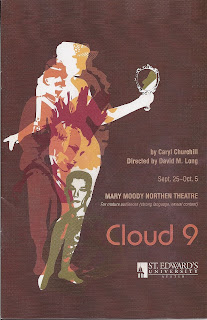
Click for ALT review, April 13
UPDATE: Reviews by Rhonda and Preston Kirk for the A-Team of the Greater Austin Creative Alliance, April 13
UPDATE: Review by Clare Croft for Statesman's A360 "Seeing Things" blog, April 12
Found on-line and received directly:
City of Angels
Book by Larry Gelbart, Music by Cy Coleman and David Zippel, Vocal arrangements by Cy Coleman and Yaron Gershovsky
Directed by Michael McKelvey, featuring Sarah Gay, Jamie Goodwin and David M. Long
Mary Moody Northen Theatre, St. Edward’s University
3001 South Congress Avenue Click for Campus map
April 8 - 18, Thursdays – Saturdays at 7:30 p.m., Sundays at 2 p.m.
Reserved Seating, Tickets available through the MMNT box office at 448-8484.
Advance $18 ($15 students, seniors, St. Edward’s community)
All tickets $20 at the door.
Special added show for students, Wednesday, April 14 at 7:30 PM --student tickets $7 with ID
Box office is open 1-5 p.m. Monday–Friday and 1 hour prior to curtain.
With wit, style and a sophisticated, jazz-inspired score, this Tony-award winning musical bounces between film noir and 1940s Hollywood glamour with dynamic musical flare. In the story, a frazzled novelist struggles to adapt his hard-boiled detective novel to the silver screen. As tensions mount, the parallels between his own life and that of his fictional detective spiral start to overlap. The Mary Moody Northen Theatre production features Equity guest artists Sarah Gay, Jamie Goodwin, and David M. Long. Michael McKelvey directs.































